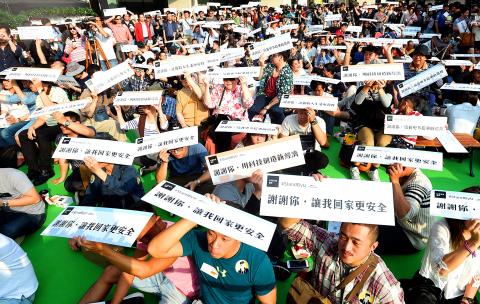US ride-hailing company Uber Technologies Inc yesterday said it does not plan to exit the Taiwanese market yet, despite looming fines.
Uber’s comments came as the San Francisco-based company is facing up to NT$25 million (US$775,194) in fines after the legislature passed an amendment to the Highway Act (公路法) earlier this month, significantly increasing fines on illegal taxi service operators by about 166 times.
Uber’s local unit could be forced to shut down after President Tsai Ing-wen (蔡英文) signs the amendment into law.

Photo: Lin Cheng-kung, Taipei Times
“The company considers Taiwan an important market,” Uber Taiwan general manager Gu Li-kai (顧立楷) said. “We hope to stay and to grow our business here. We hold a relatively optimistic view about this.”
Gu made the remarks on the sidelines of a news conference for the launch of a campaign in Taipei, “StandByU-Uber stays,” calling on consumers and drivers to support the ride-sharing service.
“We will continue to communicate with government agencies to look for any possibility of relaxing the rules… We hope to reach a consensus with the government as soon as possible,” Gu said.
The campaign is the latest effort by Uber to curry favor with the public as the company’s talks with the government have stalled.
“Uber is concerned about the heavy penalties and about their impact on freelance drivers,” Gu said.
It is unsuitable to apply existing public transportation rules, which have been in place for three or four decades, to regulate the six-year-old car-sharing industry, Gu said.
Uber offers an app-based ride-sharing service, which is very different from companies in the traditional transportation industry, he said.
The company is exploring better solutions in Taiwan and in other countries to adjust outdated rules and to make it possible for the ride-sharing industry, or the whole sharing-economy to develop, he said.
India unveiled a more liberal taxi policy to allow Uber and its Indian rival, Ola, to offer app-based ride-sharing services in the country, Gu said.
The Uber Taiwan app has been downloaded about 1 million times and the firm has recruited about 10,000 drivers since it entered the market in 2013.
Gu said the company is willing to pay e-commerce operator taxes, that mean Google Play, Uber and Apple Store pay 5 percent business tax.
Uber in talks with more than 10 insurers, including Fubon Insurance Co (富邦產險), to offer insurance solutions for its drivers, Gu said.
However, insurers are conservative about collaborating with Uber due to the government’s ambiguous stance over its ride-sharing service, Gu said.

BUSINESS UPDATE: The iPhone assembler said operations outlook is expected to show quarter-on-quarter and year-on-year growth for the second quarter Hon Hai Precision Industry Co (鴻海精密) yesterday reported strong growth in sales last month, potentially raising expectations for iPhone sales while artificial intelligence (AI)-related business booms. The company, which assembles the majority of Apple Inc’s smartphones, reported a 19.03 percent rise in monthly sales to NT$510.9 billion (US$15.78 billion), from NT$429.22 billion in the same period last year. On a monthly basis, sales rose 14.16 percent, it said. The company in a statement said that last month’s revenue was a record-breaking April performance. Hon Hai, known also as Foxconn Technology Group (富士康科技集團), assembles most iPhones, but the company is diversifying its business to

Apple Inc has been developing a homegrown chip to run artificial intelligence (AI) tools in data centers, although it is unclear if the semiconductor would ever be deployed, the Wall Street Journal reported on Monday. The effort would build on Apple’s previous efforts to make in-house chips, which run in its iPhones, Macs and other devices, according to the Journal, which cited unidentified people familiar with the matter. The server project is code-named ACDC (Apple Chips in Data Center) within the company, aiming to utilize Apple’s expertise in chip design for the company’s server infrastructure, the newspaper said. While this initiative has been

Clambering hand-over-hand, sweat dripping into his eyes, a durian laborer expertly slices a cumbersome fruit from a tree before tossing it down to land with a soft thump in his colleague’s waiting arms about 15m below. Among Thailand’s most famous and lucrative exports, the pungent “king of fruits” is as distinctive in its smell as its spiky green-brown carapace, and has been farmed in the kingdom for hundreds of years. However, a vicious heat wave engulfing Southeast Asia has resulted in smaller yields and spiraling costs, with growers and sellers increasingly panicked as global warming damages the industry. “This year is a crisis,”

HIGH-TECH: As leading-edge process technologies become more complicated, only a handful of players are able to provide design services, the company’s CEO said Artificial intelligence (AI) chip designer Alchip Technologies Ltd (世芯) yesterday said that revenue would grow significantly again in 2026 after adding a major AI chip customer, reversing moderation amid a product transition next year. The Taipei-based application-specific IC (ASIC) designer reiterated its strong revenue growth forecast for this year and 2026 after its stock plummeted about 23 percent to NT$3,145 from a peak of NT$4,085 on March 6 amid growing competition. Alchip said it has built strong partnerships with cloud service providers (CSP), denying that it had lost orders to smaller competitors such as Faraday Technology Corp (智原). Faraday said it has secured